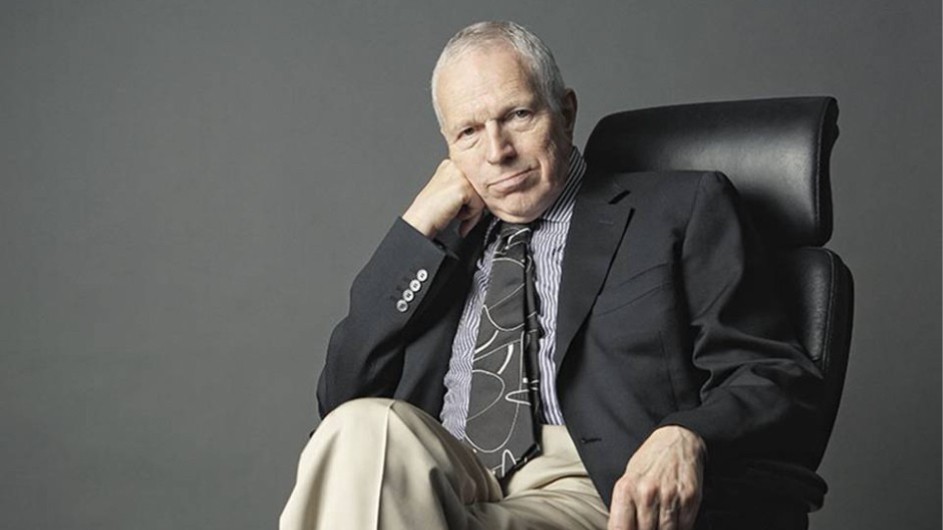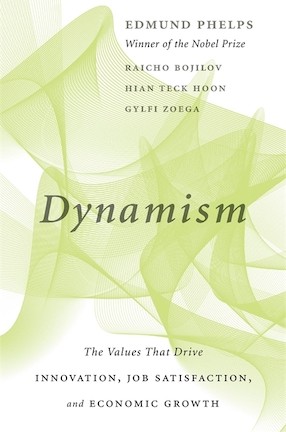A Nobel Laureate on Individualism and Prosperity
Economist Edmund Phelps talks about the importance of individualism for a country’s vitality.

Do inventors drive economic growth or do ordinary people spur innovation and prosperity? Nobel Prize winner in Economics and the director of Columbia's Center on Capitalism and Society Edmund Phelps has long argued that everyday people in a society, rather than a specific group of trained scientists, drive growth. In his latest book, Dynamism: The Values That Drive Innovation, Job Satisfaction, and Economic Growth, Phelps and his researchers present data that prove this hypothesis.
Phelps recently talked to Columbia News about his new book, how human flourishing involves more than just material prosperity, and why we need to consult great authors and philosophers of the past to help propel future innovation.
Q: What inspired you to write and edit Dynamism?
A: I wrote my magnum opus, Mass Flourishing: How Grassroots Innovation Created Jobs, Challenge, and Change, back in 2013. I realized that the book looked to economists like a history with lots of unproved hypotheses in it. So I felt I had to write this follow-up book. Dynamism is full of statistical tests and evidence of the grand hypothesis of Mass Flourishing: that dynamism and human flourishing require challenges and struggles, not just material prosperity. Individualism, as described by the Italian Renaissance philosopher, Pico della Mirandola, and vitalism, which was laid out by Cervantes in Don Quixote, helped foster dynamism in a society. Of course, individualism doesn’t mean selfishness.

Q: In your new book, you write that “a nation may possess dynamism—an appetite and capacity, a desire and capability—needed to create innovations and a willingness as a society to accept their introduction into the economy.” Does the United States possess dynamism to spur innovation today?
A: If a nation has the values, like individualism and vitalism, then it is capable of dynamism. If the nation is under attack, it won’t be. If it’s under a crazy president, it won’t be. My reading of history in Mass Flourishing--which is, to some extent, supported by the statistical work done by my team for Dynamism--shows that innovation dropped in the late 60's. It didn’t disappear, but it has declined, and that has pretty much stayed right through to the present, with the exception of the spectacular years of the internet revolution between 1993 and 2004.
There has been tremendous loss of innovation in a lot of traditional industries in the United States for decades, though the internet revolution brought enormous growth in many new industries. But, unfortunately, Silicon Valley only accounts for 4-5% of the total economy. That’s not enough to do much for national income. We’re much better off for having the internet, but we’re still in a protracted period of slow productivity growth owing to reduced innovation, which can be traced, I believe, to a significant loss of dynamism, indigenous to the country.
Q: We’re in this strange period of the pandemic and polarized views. Is there an opportunity to recover our sense of dynamism and the capacity to be innovative?
A: My hunch is that it’s going to take some change in high school education. It sounds hopelessly corny and old-fashioned, but I think it’s important to get back to the great books to stimulate people—to stir them with those great tales of achievement. Without that, there’s no hope.
Q: Speaking of books, which ones are you reading now?
A: On my book table is Prairie Fires: The American Dreams of Laura Ingalls Wilder by Caroline Fraser. I haven’t started it yet, but I’m interested in tales of the prairie, and what the book is going to say about the individualism of people on the prairies and their aspirations. I’m also planning on reading Confessions of an Actor: An Autobiography by Laurence Olivier. The other book on my table is a biography--The Man Who Made the Movies: The Meteoric Rise and Tragic Fall of William Fox by Vanda Krefft. Fox was a fabulous character, and I have a longtime interest in the movies.
Q: Is there a movie that inspires you in terms of individualism and innovation?
A: That movie is Shane, directed by one of Hollywood’s greatest directors, George Stevens. The actor Alan Ladd plays Shane. It’s an absolutely great and inspirational movie, about the challenges of settling the prairie. The determination that was required, the obstacles that had to be surmounted, and the bad guys, of course, who had to be overcome.
Q: You’re hosting a dinner party. Which three academics, authors, or celebrities, dead or alive, would you invite and why?
I would invite Harold Pinter, Aaron Copland, and John Updike. Pinter wrote about society and the unease that people feel operating in a world of so much uncertainty. Copland had such an appreciation for people on the frontier, for cowboys and bad guys, too, like Billy the Kid. Updike understood the problems and the difficulties that people face. When I was young, I gobbled up a lot of Updike novels.